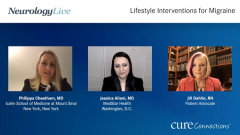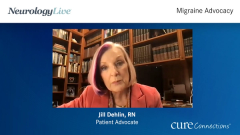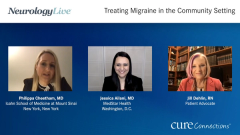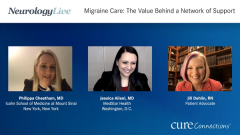
Navigating Insurance and Access Issues in Migraine
Current hurdles faced by neurologists when prescribing therapy to treat migraine and advice to help other healthcare professionals as well as patients navigate insurance and access issues.
Episodes in this series

Philippa Cheetham, MD: I think the important thing for people who are listening to this segment is that there are some very exciting, new medications out there. Dr Ailani, once you have made the right medical decisions for patients, how often do you hit a stumbling block with insurance coverage where you know, as a clinician, that this is what the best treatment option for the patient? Do you have any options to have a trial of these medications prior to insurance coverage, so that you can say, “Well, look, let’s give you a few months as a trial before we try to fight for authorization,” or is that not even an option?
Jessica Ailani, MD: We hit stumbling blocks almost all the time, to the point where I feel like I’m an expert at navigating crazy ways to avoid these situations. There are sample options available for patients, but my biggest issue with sample options is that they are a temporary fix. Many times, when dealing with the insurance issues, you can end up in a situation where the temporary fix is going to go on forever. Very quickly I have learned not to rely on that, but to figure out and invest the time into the insurance issue on the front end. Try to figure it out. I use samples to start patients off when I know that this is a medicine that is going to get covered, or if there is a problem with a dose, especially if a medication is an injectable, and the injector did not work, or somehow they left it out, or something got skipped by mistake, or there is a lag in insurance coverage to use it. This can help the patient through those situations.
Many times, on the back end, something I think patients do not realize is how much time our staff is spending on these claims; they are calling and submitting, and calling and submitting again, and writing. What does help us is honesty at the front end about what medicines the patient has taken and the adverse effects they have experienced. It is important to be patient about the time it does take to navigate the system. Knowing what drugs are on the patient’s insurance formulary is very important.
Philippa Cheetham, MD: It seems to me that, with so many medications—not just in your specialty but across the board—we have to go through this game of trying things that we know are not going to help patients, just to tick a box to say, yes, the patient has failed this treatment. At the end of the day, yes, it is wasting a lot of time and it distresses the patients, but I so often feel that that in itself wastes so much money. There is a cost in terms of a patient’s quality of life, but if a patient is having excessive tests, more scans, more admissions, more days off work—it just does not make sense financially, but we get stuck in it. Is there any advice you can give to patients that may help expedite getting approval? It must be very difficult when patients are keen to get on these medications as soon as possible. Do you find that approval, for example, is more likely to be granted if it is coming from somebody like you who can argue the case more effectively?
Jessica Ailani, MD: Actually—this is something I tell my patients and they do not believe—but it is more likely to work if the patient picks up the phone and starts to call the right people on the insurance side, and if they write letters. I find that what has happened over time is that the insurance does not really care what we have to say; they care about what the patient has to say. After a denial and then a denial of an appeal, they care what the HR [human resources] department of the person who has the insurance has to say. It is best if, early on, we are engaging the patient who—if it is the spouse’s insurance, then the spouse’s HR at their place of employment, having them call the insurance company. That is how we get a lot of our medications through. You have to educate the patient on this, and they do not believe us because they think that we have all this power, but we don’t.
Philippa Cheetham, MD: Right, no doubt there is also some belief that we are passing the buck back to the patient, to do the hard work. It is very encouraging to hear that the patients picking up the phone can actually have an effect. Do you find that when you receive denials from these companies about approval for CGRP [calcitonin gene-related peptide] inhibitors, you get a reason or something explaining, “Well, we are denying it, and this is why.” If so, what is the reason for denial?
Jessica Ailani, MD: Well, sometimes the denials are based on if the patient has not tried the appropriate therapies. They have not tried everything on the formulary. They say, “We cannot guarantee they are not taking X, Y, or Z.” Once I got a denial, a few times I’ve seen this, where they said that they cannot guarantee that the patient is not taking another CGRP monoclonal antibody, when the patient has already stopped that medicine. That to me, is the most frustrating thing because you are the insurer, and you see the pickup medication history.
That makes me sometimes wonder, so I have to call the patient and say, “Did you pick up this medicine in the last 3 months? I thought you stopped it.” They will say, “I haven’t picked it up from the pharmacy.” To me, it is just a way to put up a stopgap because clearly the insurance company knows it is not being picked up, but they just provide another reason for the denial. Today we got one that said because the patient has been on a CGRP monoclonal antibody for 6 months, they are no longer allowed to get their triptan, because according to the insurance company, they should not need it as they are on a preventive, which is not a cure for migraine, but….
Philippa Cheetham, MD: Unbelievable.
Jessica Ailani, MD: It just goes to show you the layers and layers of stigma that go all the way up through the insurance companies and how much work we still have to do.
Philippa Cheetham, MD: Thank you for watching NeurologyLive® Cure Connections®. If you enjoyed the program, please subscribe to our e-newsletter to receive upcoming programs and other great content right in your inbox. Thank you so much.
Transcript Edited for Clarity
Newsletter
Keep your finger on the pulse of neurology—subscribe to NeurologyLive for expert interviews, new data, and breakthrough treatment updates.





























